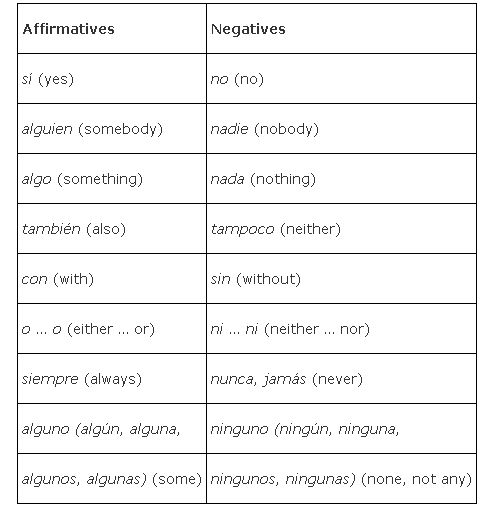A Spanish sentence utilizes multiple negative words in one sentence, and there must be a negative word in front of the verb for a clause to be negative. If no other negative word precedes the verb, the word
no is placed (preceding any RID pronouns) in front of the conjugated verb.
The use of the following affirmative words and their negative counterparts is explained below.

Alguno is used in front of the preposition de to mean “any” or “some.” When this word directly precedes a singular masculine noun, it shortens to algún. The other forms follow typical gender and number patterns and precede the nouns they modify:
- Alguno (de ellos) vendrá a la fiesta. Ella comprará algún bolso.
- Any (one of them) will come to the party. She will buy a bag (any kind).
- Algunos problemas son imposibles de resolver. Algunas veces es difícil continuar.
- Some problems are impossible to resolve. Sometimes it's difficult to continue.
When a sentence is negative, ninguno is used to mean “none” when preceding the preposition de or when used alone to replace a noun. When immediately preceding a masculine noun, it shortens to ningún; the other forms show the gender and number of the noun they precede:
- No tengo ningún problema. No me dan ninguna libertad.
- I don't have any problem. They don't give me any freedom.
Algo means something and nada means nothing. When a sentence is negative, nada must be used rather than algo—even when the English sentence would use “something.” Nada can also be used as an adverb that has the effect of a negative intensifier. In this case, it means “not at all”:
- Tú no has dormido nada — no puedes conducir.
- You haven't slept at all—you can't drive.
- Lolita doesn't work at all.
When algo is used in a similar fashion, it means “somewhat”:
- Ese proyecto es algo complicado.
- That project is somewhat complicated.
|
|
|
|
|
|
|
|